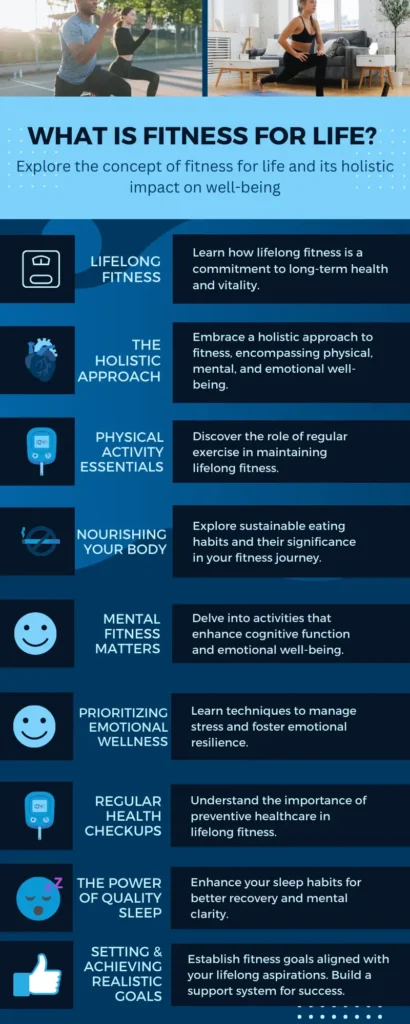What is Fitness for Life? Fitness is not just a short-term goal; it’s a lifelong journey that impacts our health, well-being, and overall quality of life. In this comprehensive guide, we will delve into the concept of “fitness for life” and explore how it extends beyond mere workouts and diets. We’ll discover the key components of lifelong fitness and how you can embrace this holistic approach for a healthier, happier life.
Understanding Lifelong Fitness
Lifelong fitness is the commitment to maintaining and improving your physical, mental, and emotional well-being throughout your life. It’s about adopting sustainable habits that promote longevity, vitality, and a higher quality of life. Lifelong fitness focuses on consistency rather than quick fixes.
The Holistic Approach
To achieve fitness for life, it’s crucial to take a holistic approach. This means considering not only physical fitness but also mental and emotional health. Activities such as mindfulness, stress management, and self-care play a vital role in this journey.
The Role of Physical Activity
Regular physical activity is the cornerstone of fitness for life. It includes a mix of aerobic exercises, strength training, flexibility work, and balance exercises. These components work together to keep your body strong, agile, and functional.
Nutrition for Longevity
A balanced and sustainable diet is essential for lifelong fitness. It’s about nourishing your body with wholesome foods that provide the necessary nutrients for energy, repair, and overall health. We’ll explore sustainable eating habits and their impact on your well-being.
Mental Fitness
Mental fitness involves maintaining cognitive function, emotional resilience, and psychological well-being as you age. We’ll discuss activities that enhance mental fitness, such as puzzles, mindfulness, and continuous learning.
Emotional Wellness
Emotional wellness is another integral part of fitness for life. It involves managing stress, building positive relationships, and fostering emotional resilience. We’ll explore techniques to enhance emotional well-being.
Regular Health Checkups
Regular health checkups are essential for early detection of potential health issues. We’ll emphasize the importance of preventive healthcare in your fitness journey.


Quality Sleep
Quality sleep is crucial for recovery, mental clarity, and overall health. We’ll provide tips for improving your sleep habits to support lifelong fitness.
Setting Realistic Goals
Setting realistic and achievable fitness goals is essential for staying motivated. We’ll guide you in establishing goals that align with your lifelong fitness aspirations.
Building a Support System
Finally, we’ll discuss the significance of a support system. Surrounding yourself with like-minded individuals or seeking professional guidance can help you stay on track with your fitness for life journey.
Conclusion:
Fitness for life is not a destination but a continuous journey. By adopting a holistic approach that encompasses physical, mental, and emotional well-being, you can enjoy a healthier, happier, and more fulfilling life. Make a commitment to lifelong fitness, and reap the rewards of vitality and longevity.
ALSO READ:
| Apne Sanwle Rang Ko Kaise Qubool Karen – Self-Confidence Ko Barhayein (Embrace Your Dark Skin)
| 10 Easy Tareeke Jo Exercise Ke Liye Motivation Mein Zaroori
| The Ultimate Guide to Success: 10 Habits of Highly Successful College Students
What is fitness for life
FAQ
Q1: What is the essence of “fitness for life”?
A1: “Fitness for life” emphasizes maintaining and improving physical, mental, and emotional well-being throughout one’s entire life. It’s about adopting sustainable habits that promote longevity and a higher quality of life.
Q2: What is the holistic approach to fitness for life?
A2: The holistic approach considers not only physical fitness but also mental and emotional health. It involves activities like mindfulness, stress management, and self-care to achieve overall well-being.
Q3: How does physical activity contribute to fitness for life?
A3: Regular physical activity, including aerobic exercises, strength training, flexibility work, and balance exercises, is essential for keeping the body strong, agile, and functional as we age.
Q4: What role does nutrition play in lifelong fitness?
A4: Nutrition is critical for lifelong fitness. It involves nourishing the body with wholesome foods to provide the necessary nutrients for energy, repair, and overall health.
Q5: How can one enhance mental fitness?
A5: Mental fitness is enhanced through activities like puzzles, mindfulness, and continuous learning, which help maintain cognitive function, emotional resilience, and psychological well-being.
Q6: What are the key components of emotional wellness in fitness for life?
A6: Emotional wellness includes stress management, building positive relationships, and fostering emotional resilience. These components contribute to a holistic sense of well-being.
Q7: Why are regular health checkups important in fitness for life?
A7: Regular health checkups are crucial for early detection of potential health issues, allowing for timely interventions and preventive healthcare.
Q8: How does quality sleep impact fitness for life?
A8: Quality sleep is essential for recovery, mental clarity, and overall health. Improved sleep habits positively affect lifelong fitness.
Q9: What is the significance of setting realistic goals in fitness for life?
A9: Setting realistic and achievable fitness goals is essential for staying motivated and maintaining long-term commitment to lifelong fitness.
Q10: Why is building a support system important in the journey of fitness for life?
A10: A support system, comprising like-minded individuals or professionals, provides encouragement, guidance, and motivation to help individuals stay on track and achieve their fitness for life goals.

